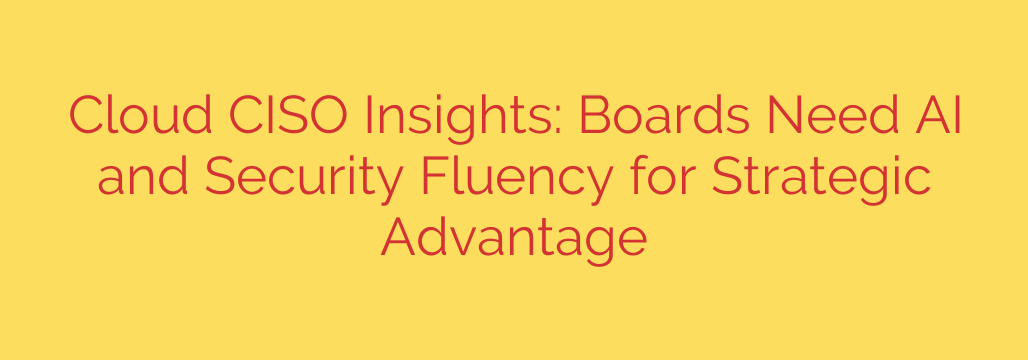
The New Boardroom Mandate: Mastering AI and Cybersecurity for Strategic Advantage
The days when a corporate board could relegate cybersecurity and technology to the IT department are definitively over. In today’s landscape, where digital transformation is synonymous with business survival, a new mandate has emerged for leadership: fluency in both Artificial Intelligence (AI) and cybersecurity is no longer a niche skill, but a core competency for effective governance and strategic leadership.
This shift moves the board’s role from passive oversight to active strategic partnership. Understanding the intricacies of digital risk and opportunity is now as fundamental as understanding financial statements. For modern organizations, cybersecurity is not a cost center; it is a critical business enabler that protects revenue, preserves brand reputation, and builds customer trust.
AI: The Ultimate Business Catalyst and a Formidable Threat
Artificial Intelligence sits at the heart of this new paradigm, presenting a classic double-edged sword. On one side, AI offers an unprecedented opportunity to bolster defenses. AI-powered security tools can analyze billions of data points in real-time, detect anomalies with superhuman speed, and automate incident response, freeing up human experts to focus on the most complex threats.
However, the other side of the blade is just as sharp. Adversaries are leveraging the same AI tools to launch sophisticated, scalable attacks that can bypass traditional security measures. From hyper-realistic phishing emails and deepfake videos designed for social engineering to AI-driven malware that can adapt to its environment, the threat landscape is evolving at a breakneck pace.
A board that only sees the promise of AI without understanding its risks is navigating blind. True fluency means appreciating this duality and ensuring the organization is prepared to harness the good while defending against the bad.
Key Questions Every Board Member Must Ask
To steer the organization effectively, board members don’t need to be coders or security engineers, but they do need the knowledge to ask probing, intelligent questions. This dialogue transforms the CISO from a technical briefer into a strategic advisor.
Here are the critical questions that should be on every board’s agenda:
- How are we strategically using AI to enhance our security posture? The conversation should move beyond simply buying new tools to discussing how AI is integrated into the overall defense strategy to reduce risk and improve resilience.
- What are the primary business risks associated with our own AI adoption? This includes concerns about data privacy, model integrity, algorithmic bias, and the potential for a new, expanded attack surface.
- Are we adequately prepared for AI-driven threats from malicious actors? Does our incident response plan account for deepfake-based disinformation campaigns or automated network attacks?
- Does our security budget accurately reflect our business risk and strategic goals? Investment should be framed not as an expense, but as a strategic allocation of capital to protect the company’s most valuable assets.
- How are we ensuring compliance with evolving regulations, like the SEC’s cybersecurity disclosure rules? The board must have a clear line of sight into the processes for identifying and reporting material security incidents.
Actionable Steps for a Resilient, AI-Ready Future
Achieving this level of fluency requires a deliberate and sustained effort. It’s a cultural shift that starts at the top and permeates the entire organization.
Foster a Culture of Shared Responsibility. Security is not just the CISO’s problem. The board must champion the idea that cybersecurity is a collective, “shared fate” responsibility, where every department, from finance to marketing, understands its role in protecting the organization.
Empower the CISO as a Business Strategist. The Chief Information Security Officer (CISO) must have a permanent seat at the strategic table. They should be encouraged to communicate in the language of business—risk, ROI, and competitive advantage—not just technical metrics. This builds a bridge of understanding between the security team and the executive leadership.
Prioritize Foundational Security Hygiene. While AI presents new challenges, it doesn’t eliminate old ones. Robust foundational security—including multi-factor authentication (MFA), timely patching, zero-trust architecture, and employee training—remains the most effective defense against the vast majority of cyberattacks. These fundamentals are the bedrock upon which advanced AI defenses are built.
Invest in Continuous Board-Level Education. The threat landscape is not static, and neither should the board’s knowledge be. Regular, jargon-free briefings on emerging threats, new technologies, and the evolving regulatory environment are essential for making informed decisions.
Ultimately, cybersecurity and AI fluency are no longer optional specialties for a select few directors. They are fundamental components of modern corporate governance. The boards that embrace this new mandate will not only protect their organizations from catastrophic risk but will also unlock a powerful strategic advantage, positioning their companies to lead securely and confidently in the age of AI.
Source: https://cloud.google.com/blog/products/identity-security/cloud-ciso-perspectives-boards-should-be-bilingual-AI-security-gain-advantage/








